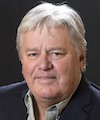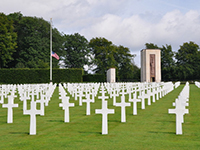“This operation is not being planned with any alternatives. This operation is planned as a victory, and that's the way it's going to be. We're going down there, and we're throwing everything we have into it, and we're going to make it a success."
—General Dwight D. Eisenhower on Operation Overlord
 |
| Kevin Foley |
Today, June 6, marks the 75th anniversary of the D-day invasion, which we reverently remember as the beginning of the end of Hitler’s brutal reign in Europe.
Those young men, many in their late teens, knew what they were heading into on Omaha, Juno, Gold, Sword and Utah beaches—a hurricane of German shells and bullets—yet they reached down deep and found the courage to face that murderous fire and somehow overcome it.
As Sgt. Collier, Brad Pitt’s character in the film “Fury” tells his new tank gunner, “Ideals are peaceful. History is violent.” And so it was for the boys who went ashore and watched their comrades fall in horrific numbers. They were changing the course of history; their ideals leading them to the Normandy coast where they confronted a profound evil and ultimately defeated it less than a year later.
"After enduring all the ordeals and training in England, we felt like we were completely ready for anything, and we were very ready to fight the Germans, and we looked forward to the day that we could actually get into the real fight," said Sgt. Bob Slaughter of the 116th Infantry Regiment, 29th Division.
Few of those boys remain, but we owe them, along with those who died on the beaches, and those who survived the war but are gone now, a debt of gratitude we can never repay. Had their assault failed, had the Germans been able to turn them back, the outcome could have been decidedly different.
What must it have taken to be in one of those Higgen’s boats, bullets pinging off them and 88 shells bursting all around as they closed on the beach? What sort of men could swallow their terror and wade ashore after the ramp fell?
Omaha was particularly bloody. There, the cliffs rose above them, from which the Germans raked their deadly cross-fire through the GIs below. For a little while, it looked like the Americans were pinned down and the attack would fail. Still, those boys found a way to mount the heights and destroy the enemy.
The sort of men that takes could only have been born and raised in America, instilled with deep principles and conviction; men who believed in the cause for which they fought and were willing to lay down their lives in the name of freedom. A society of ideals turns out such men, a society in which everyone has a say, hard work is rewarded, education is honored, liberty is cherished, and God is held in our hearts.
 |
I have not had the opportunity to visit the cemeteries at Normandy, but I did go to the American cemetery in Luxemburg, where row upon row of headstones marked the graves of the courageous who were thrust into what we call today the Battle of the Bulge. Undermanned and outgunned in the freezing cold, Americans, many of whom had fought in Normandy, took on and defeated a last ditch German attack aimed at cutting off allied supply lines. Again, if those boys had failed, the course of the war could well have swung in Hitler’s favor.
Surrounded at the village of Bastogne by a vastly superior German force demanding an American surrender, commanding officer Gen. Anthony Clement replied with a one word missive that elegantly and succinctly underscored the indomitable resolve of his men: “Nuts.”
That’s the sort of man America produces and has always produced.
At the end of the war, Hitler dead and his henchmen rounded up, we didn’t punish the German people or take their land. Rather, we initiated the Marshall Plan to help them get back on their feet, thus showing another side of American idealism: mercy and benevolence.
When the Korean War came along, we saw American resolve again at the Pusan Perimeter, the Incheon Landing and the Chosen Reservoir; in Vietnam, more examples at Hue and Khe Sanh. We saw it in Desert Storm, Fallujah in Iraq, and it continues in to this day in Afghanistan.
We can argue if the later wars were justified, but we can never question the valor and commitment of the men and women who fought in those and many other places over the 75 years since that fateful morning on the beaches of France.
D-day was a marker, an heroic event etched into history. What it demonstrated about this country and its people, about that which we hold dear, is a shining example we can hold up for the rest of the world to admire and emulate.
God bless all of those boys.
***
Kevin Foley owns KEF Media in Atlanta.


 The NBA, which promotes legalized gambling 24/7, seems more than hypocritical for banning player for placing bets... Diocese of Brooklyn promises to issue press release the next time one of its priests is charged with sexual abuse... Truth Social aspires to be one of Donald Trump's iconic American brands, just like Trump University or Trump Steaks or Trump Ice Cubes.
The NBA, which promotes legalized gambling 24/7, seems more than hypocritical for banning player for placing bets... Diocese of Brooklyn promises to issue press release the next time one of its priests is charged with sexual abuse... Truth Social aspires to be one of Donald Trump's iconic American brands, just like Trump University or Trump Steaks or Trump Ice Cubes. Publicis Groupe CEO Arthur Sadoun puts competition on notice... Macy's throws in the towel as it appoints two directors nominated by its unwanted suitor... The Profile in Wimpery Award goes to the Ford Presidential Foundation for stiffing American hero and former Wyoming Congresswoman Liz Cheney.
Publicis Groupe CEO Arthur Sadoun puts competition on notice... Macy's throws in the towel as it appoints two directors nominated by its unwanted suitor... The Profile in Wimpery Award goes to the Ford Presidential Foundation for stiffing American hero and former Wyoming Congresswoman Liz Cheney. JPMorgan Chase chief Jamie Dimon's "letter to shareholders" is a must-read for PR people and others interested in fixing America and living up to its potential... Get ready for the PPE shortage when the next pandemic hits... Nixing Netanyahu. Gaza carnage turns US opinion against Israel's prime minister.
JPMorgan Chase chief Jamie Dimon's "letter to shareholders" is a must-read for PR people and others interested in fixing America and living up to its potential... Get ready for the PPE shortage when the next pandemic hits... Nixing Netanyahu. Gaza carnage turns US opinion against Israel's prime minister. Trump Media & Technology Group sees Elon Musk's X as an option for those who want the free expression promised by Truth Social but without Donald Trump, owner of 57.3 percent of TMTG... Chalk one up for "anti-woke warrior" governor Greg Abbott as University of Texas lays off 60 DEI-related staffers... Five percent of Americans see the US as its own worst enemy, according to Gallup.
Trump Media & Technology Group sees Elon Musk's X as an option for those who want the free expression promised by Truth Social but without Donald Trump, owner of 57.3 percent of TMTG... Chalk one up for "anti-woke warrior" governor Greg Abbott as University of Texas lays off 60 DEI-related staffers... Five percent of Americans see the US as its own worst enemy, according to Gallup. Nine of the Top 100 firms that participated in O'Dwyer's rankings last year apparently threw in the towel for the 2024 scorecard. Seven other firms also went AWOL.
Nine of the Top 100 firms that participated in O'Dwyer's rankings last year apparently threw in the towel for the 2024 scorecard. Seven other firms also went AWOL.


 Have a comment? Send it to
Have a comment? Send it to 
No comments have been submitted for this story yet.